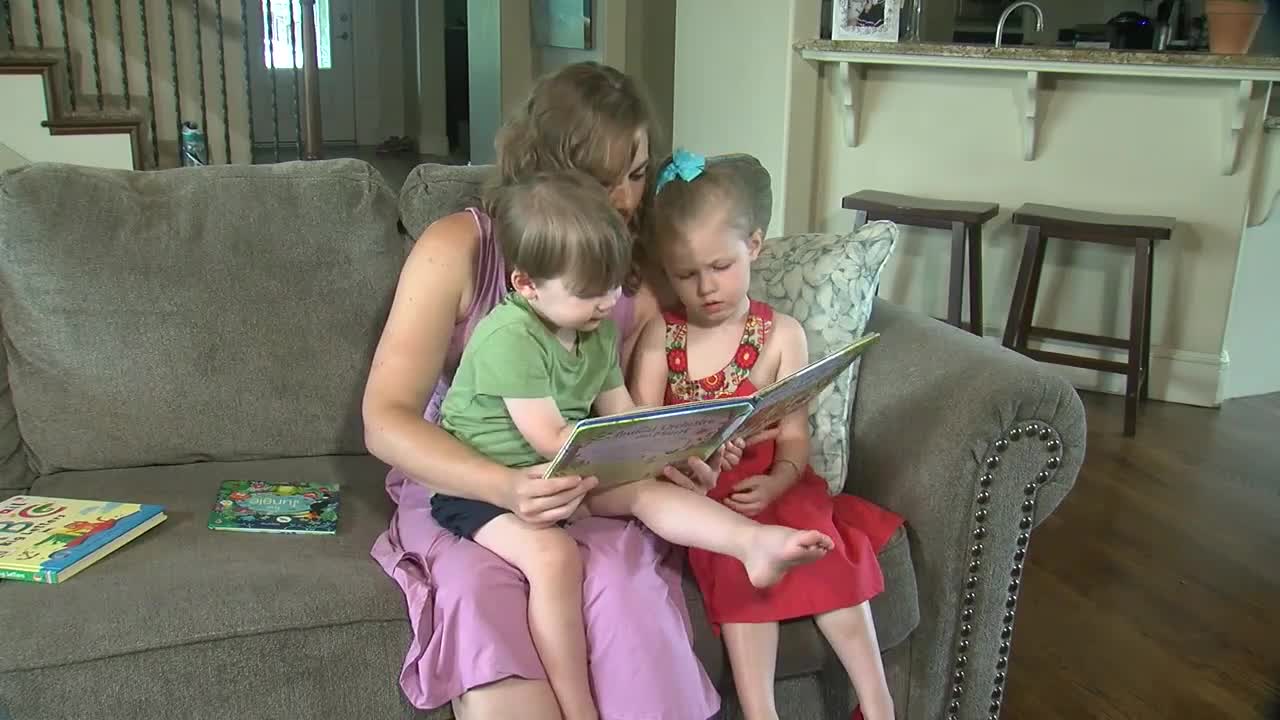TULSA, Okla. — Some predictions have indeed proven to be fickle.
Remember flying cars by 2000? Will they fly by 2050? Some researchers say, maybe.
It's only natural for parents to wonder how the future will affect their children. Lydia and Eric Olson are trying to picture what life will be like by mid-century for their preschoolers, Luke and Allie.
2 News Oklahoma found the Olsons enjoying the simple things of life, playing board games, and reading books, old school, and low tech, considering the technology boom of the past several years.
"As a mother," Lydia told 2 News, "it's hard for me not to worry about a lot of things."
Including that tech boom, Lydia and Eric Olson said, which some believe is a shadow of the technological explosion still to come, in the years, in the decades ahead.
Lydia said, "It is exciting but scary. Probably one of the things I worry about most about them being young is the technology and smartphones and how it's going to affect their development, their education."
That development, some experts say, will be critical for keeping up in future years.
Eric researches issues like these as an associate professor of Finance and International Business at the University of Tulsa.
As far as Allie and Luke's education goes, technology will take center stage, but Eric said today's top business leaders have words of advice. "They're telling us soft skills are important skills students need. You need technical skills but in conjunction with soft skills as well."
Those social skills experts say many young folks lack these days because they're glued to their screens and social media. It's a critical connection to the expected job market of years to come.
Eric said, "There's been some debate right now about whether machines are going to take the place of workers. What seems to be taking place is they're not substitutions, they're complementary, what you need is high skills labor using high-end machines."
By 2050, some say 40% of today's jobs will be lost to automation. Even some white-collar jobs may be performed by artificial intelligence, accountants, lawyers, and marketers, to name a few.
Researchers said the transitional stage into a vastly automated workplace, one that changes rapidly and constantly, could be the most challenging.
But the same research shows there could be an influx of social jobs requiring imagination, empathy, and one-on-one, face-to-face interaction.
Thriving sectors are predicted to be in healthcare, teaching, and the creatives, making those soft, social skills important.
Engineers, mechanics, and repairmen are expected to stay in demand, too, according to some predictions.
Lydia said, "One of the things that is exciting is how many opportunities I think my kids are going to have."
But if predictions hold, Lydia and Eric believe their kids will have a lot of competition for the best jobs in the Tulsa area.
Eric said a shift in population started even before the COVID-19 pandemic. But now it's becoming a significant shift, from the big, high cost of living cities, mainly on the coasts, to smaller cities, in the heartland.
With its diversified economy and cultural development, Eric said Tulsa is primed for growth and could double its population. "I think you could see where Nashville is now, is where Tulsa is going to be in 15 to 20 years."
And it may not be that long, Eric said, until the marriage of finance and technology flourishes, building on the change in cash payments of the last few years. "The nature of money and payments are going to change dramatically."
Society could become cashless. Greenback dollars transform into digital dollars or other crypto-type currency. But Eric said changes in currency are nothing new. "This experiment has already been run. It was called wildcat banking, back in the 1820s to 1860s, where every bank could print its own currency."
Three decades ago, he reminds his students, no one had heard of Apple, Amazon, Netflix, or Facebook.
"Going back and looking at how dynamic the US economy is, changes that have taken place, the magnitude of those changes can take place over the next 30 years as well," he said.
But what will that reality mean for Luke and Allie in 30 years? Will they eventually live in a primarily simulated world, a "virtual reality"?
Predictions include half of all vehicles by 2050 will run on anything from electricity to solar power to pressurized air. Many will be self-driving.
85% of the power will come from renewables, like solar and wind.
High-speed travel will be the norm, from 700 mile-per-hour trains running through tubes on the ground, supersonic jet service in the sky, and even beyond with space travel.
Some predict homes will be controlled by artificial intelligence, and drone delivery will be standard for online shopping.
As for the Olsons and their children, maybe, the years leading to 2050 will be a time and a place where the sky truly is the limit for their children, and perhaps, the future will take them even further.
"You know my daughter has a book about the moon and a book about astronauts, and she's already asking if we can go to the moon," Lydia said.
Amazing and exciting experiences Lydia and Eric haven't even dreamed of as they wonder and worry about how the simple things may change, wonder about their children's lives in the future, their lives in 2050.
But as everyone learned in the past year, world events from wars to pandemics can change everything and alter the future.
And something else we can learn from the past is time passes quickly.
WATCH the full story Monday on 2 News Oklahoma at 6 p and AFTER the Olympics.
Stay in touch with us anytime, anywhere --
- Download our free app for Apple, Android and Kindle devices.
- Sign up for daily newsletters emailed to you
- Like us on Facebook
- Follow us on Instagram
- Follow us on Twitter





